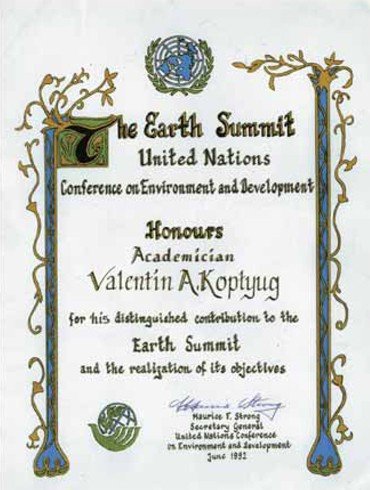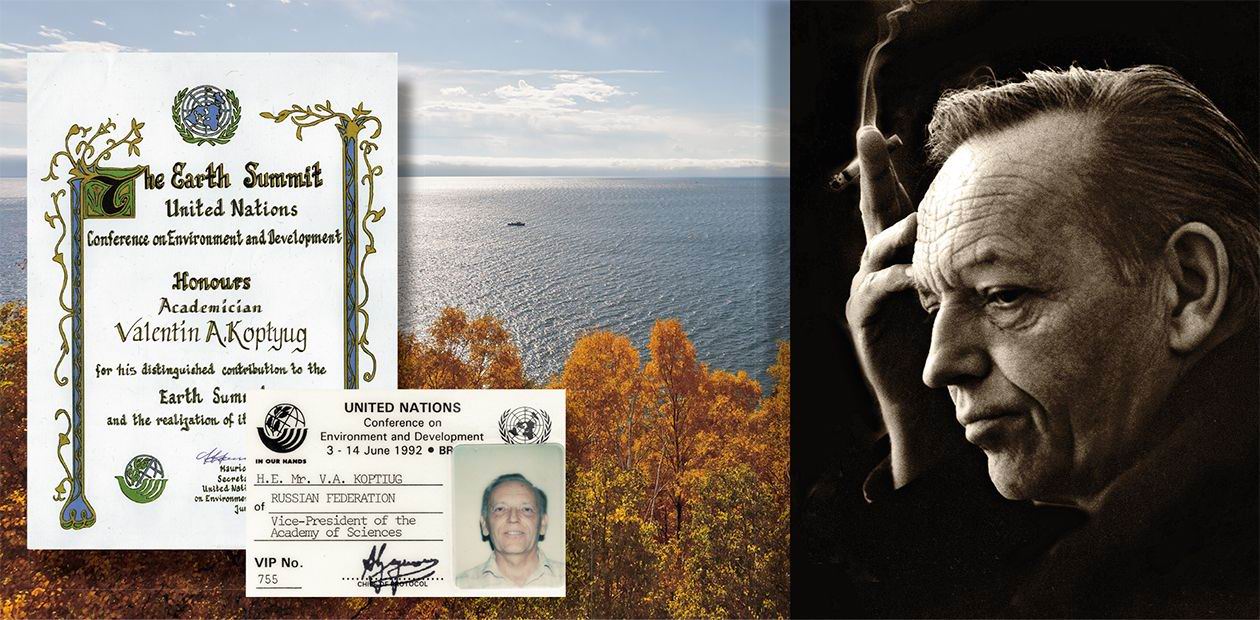Sustainable Development: A Lesson from Valentin Koptyug We Are Yet to Learn
November 10, 2015 is officially announced as 2015 World Science Day for Peace and Development. Established by UNESCO in 2001, World Science Day offers an opportunity to demonstrate to the wider public why science is relevant to their daily lives. This year's theme is ‘Science for a Sustainable Future’ to highlight the role of science in attaining the sustainable development agenda. In this context, we would like to recall the contribution of Valentin A. Koptyug, an outstanding Russian scientist, teacher, and public leader, to the promotion of the ideas of sustainable development in Russia and worldwide
Science support for environmental protection was an area of constant concern for Koptyug. He consistently struggled against the project of Partial Flow Transfer of Northern and Siberian Rivers to the South, called attention to the problem of preserving freshwater in Lake Baikal, and organized other environmental initiatives.
Having participated in the UN Conference on Environment and Development in Rio de Janeiro in 1992, he became an ardent supporter and propagandist of a new paradigm for sustainable development, being at that time almost the only one in Russia.

Adapted from: Koptyug V.A. Is it Possible to Develop a Strategy for Sustainable Development in Today's Russia? Lecture read on September 25, 1996. // Koptyug V.A. Selected Works. Moscow: Nauka, 2006. V.4. P.441. [In Russian]
In 1994 the UNO General Secretary Boutros Ghali invited Koptyug (the only one from Russia) to join the Sustainable Development Advisory Council. One of Koptyug’s proposals was to designate areas that could become models of sustainable development. As a result of the intensive work carried out at SB RAS institutes as well as by UNESCO representatives, in 1996 Lake Baikal was included into the World Environmental Heritage List and recognized as international as well as national heritage.
Being a strong supporter of the socialist idea, he managed to gain a deep understanding of market mechanisms. What the leading world economists now write about the situation in Russia, Koptyug discussed openly and persistently from the first steps of perestroika with different audiences, including supreme authorities. He saw the way to attain the ideals of sustainable development in the convergence of public administration experience gained by socialist-oriented countries and the experience of market self-regulation in the economies of developed capitalist countries.
Today, scientists form a civilizational concept of sustainable development, which is socialist in essence. I have repeatedly pointed out that Russia is better prepared than any other country in the world for this path of development. We have vast resources, and we have huge industrial and agricultural potential. The mentality of the society facilitates the adoption of this development concept and, besides, even though we have made mistakes, we have quite advanced along the socialist path. We need to become world leaders on the new path.Adapted from: Koptyug V.A. Science Will Save Humanity. (The Last Interview) // Argumenty i Fakty, N 4, January 1997. [In Russian]
“Sometimes it seemed that he [Koptyug] was a man from the future who found himself in a different epoch, so much his mentality differed from that of the others,” says Svetlana Chubchenko, in 1993–1996 Koptyug’s assistant consultant on economic questions. Finding our way to sustainable future is another lesson we are yet to learn from this great personality.
For more detail about the life and work of Valentin Koptyug, see the article Lessons from Koptyug by Nikolay Dobretsov.
Prepared by Alla Kobkova









